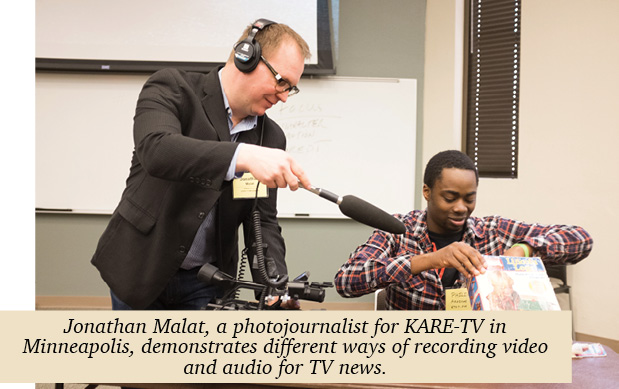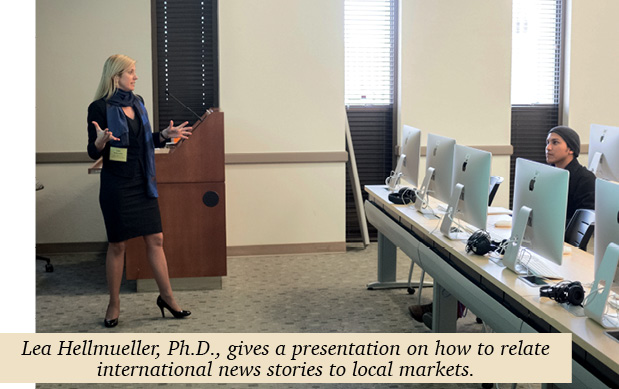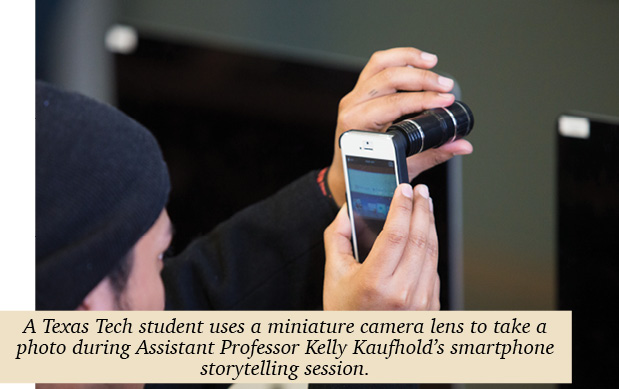Learning from Experience
The College of Media & Communication was abuzz with journalism one Saturday last year as professionals and students from near and far spent the day discussing their passion.
The Texas Association of Broadcasters sponsored a broadcast journalism workshop on campus in the college March 8, 2014. Students, faculty and professionals alike shared tips and tricks learned in the field. Eighteen sessions were held throughout the day over topics ranging from investigative reporting to media law.
Professor and Dean David D. Perlmutter, Ph.D., greeted the conference attendees. He said versatility is becoming vital in the field of journalism and that Texas Tech is teaching its journalism students how to succeed in all aspects of the field.
“Employers want critical thinkers, entrepreneurs and innovators who can communicate effectively across many media,” Perlmutter said. “We want to produce one-woman bands who can take a story and repackage it 10 different ways across different platforms.”
Assistant Professor Kelly Kaufhold, Ph.D., led a session on storytelling by smartphone. Kaufhold spoke about how using social media on a smartphone can be an easy way to get a story started.
“I teach my students to tell stories in a certain way through social media,” Kaufhold said. “There is a saying that ‘journalism is the first recording of history’ and if that is true, social media is the first pass of that. Social media can make a great way to lay out the story in steps. The nice thing about this is that if I wanted to go back later and write a print article, some of my notes are already there.”
Journalism alumna Brittany Escobar (BA Journalism, 2011), discussed how she got her first newsroom job. Escobar works as an anchor, editor, producer and reporter at KLBK news station in Lubbock. Escobar said having contacts in the profession and confidence can be helpful in getting that first job.
“The one thing I want you to take out of this session is networking,” Escobar said. “Networking is key. It is how I started my job. Another thing is just be confident and not let anyone bruise that goal of where you want to be or where you are going.”
Students from all over the college attended the workshop. The workshop focused on broadcast journalism but even students from different areas of media attended and learned a few tips. One of these students was Caitlan Osborn, a graduate student from Lubbock, Texas.
“I was not a broadcast journalism major in undergrad,” Osborn said. “My background is in print journalism so it was interesting to see the broadcast journalism side. I also got to make some connections for jobs that I will hopefully be applying for in the future.”
Assistant Professor Jerod Foster, Ph.D., led a session on blogging. Foster spoke about the increased presence of blogs in the media and what can make a blogger credible.
“Blogging has turned from a place to write down thoughts,” Foster said. “Blogging can now serve people as their living and sole online presence. Blogger credibility can be achieved through the writer’s knowledge of the topic and their stakeholding in the industry that they are writing about.”
Foster also had a word of advice for people looking to get into blogging. Foster said everything from the title of the blog to graphics featured on the blog could draw people in or repel people from reading it.
“Always start your posts with a visual,” Foster said. “Do not start with words. We put pictures on the covers of magazines for a reason. It is to sell that publication. Some sort of graphic or video helps out quite a bit. That is one of the most useful things I have learned. Some people come to photography websites to look at pictures and get out. They do not want to start off with words.”
Assistant Professor Lea Hellmueller, Ph.D., led a session on global journalism. She discussed how journalists could make world news more local. She said smaller stories are just as important as bigger stories.
“We are living in a global community,” Hellmueller said. “So, the merging of local and global news has become more important as we tell a story. This has become known as ‘glocalization.’ Climate change and disease outbreaks are examples of this. These stories do not have a national boundary but we have to make these stories have local boundaries in order to tell the story.”
Les Rose, photojournalist at CBS News, led a session detailing some Texas segments from a series of stories he worked on called “Everybody Has a Story.” These stories started with a dart thrown at a map of the United States. Wherever the dart landed, Rose and reporter Steve Hartman would travel to and contact a resident from the phone book. C.W. Moore and his wife Pat were featured in one of these segments and were also in attendance at the conference.
C.W. and Pat Moore were living in Motley County, Texas, when they got the call. Rose and Hartman had been in Motley County the year before following former local basketball coach Mike Norel. The Moores were living next door to Norel at the time. Rose and Hartman followed the Moores for a weekend as the Moores cared for the cattle on their ranch. C.W. had previously worked as a senior special agent for U.S. Customs and Border Protection.
“I answered the phone and could not believe it,” Pat said. “They had just been literally next door the year before. They usually profiled the person who answered the phone but I thought C.W. had the better story as a former federal agent who now raises cattle.”
A common theme discussed throughout the workshop was the importance of internships. Escobar said that many first jobs in the broadcast field are due to excelling at internships. She had some advice for students who will be interning in the future.
“I think internships are super, super important,” Escobar said. “I started with an internship and moved up, moved up, moved up. But, if you want to make that internship a job, you have to go above and beyond. When you go out with a reporter, write something as if you are the reporter. If there is time, ask if you can do a stand-up.”
The day ended with an advice session led by local news managers. This session covered the DOs and DON’Ts of getting a job in a newsroom. Abner Euresti (BA Telecommunications, 1974), KCBD managing editor, said flexibility is key in getting a job.
“I want to see your range,” Euresti said. “We get so many people who don’t like covering murder stories. They want to pick and choose. Eventually, you might get to that point. But, show us you can cover a trial and then cover soft news. If I can see this person can do it all, that is what I want to see on your reel.”
Osborn said she enjoyed all of the sessions but one of her favorite sessions was a session over investigative reporting lead by KTRK reporter Brian Collister. She also said she would like to attend another workshop in the future.
“My favorite part of the day was the investigative reporting session,” Osborn said. “I enjoyed getting the chance to get to know some of the inner workings of journalism. I think the next workshop sponsored by Texas Association of Broadcasters will be in Austin this fall. I would love to go to that.”
(Preston Redden graduated in 2015 with a Master of Arts degree in Mass Communications and in 2012 with a Bachelor of Arts degree in Journalism. David Vaughn graduated in 2014 with a Bachelor of Arts degree in University Studies.)




